Spring 2016 Recycling Newsletter
The articles in the Waltham Recycling Newsletter were written by Brandeis University Interns, Sandy Watemberg and Brendan Schneider. It was prepared by Social Media Coordinator, Abby Auld.
1. Recycling in Panama
2. Where do our Recycled Materials Go?
3. Recycling Plastic Bags
4. Help Save the Bees!
5. Styrofoam Collection Day
6. Organic Plant Sales
7. Button Cell Battery Recycling Program
Recycling in Panama
Written by Sandy Watemberg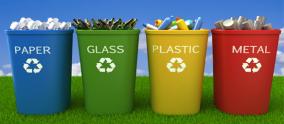
My name is Sandy Watemberg and I am a Panamanian student at Brandeis University. Since I was in high school I have been interested in environmental studies and that is what I am majoring in at Brandeis. I am currently interning in the Waltham Recycling Department to learn more about how the department works and how waste is managed in the country since I would like to encourage a culture of recycling in my country.
Panama is a very small country in Central America about the size of South Carolina, blessed with one of the greatest biodiversity of the region. We have leafy forests, high mountains and warm beaches at a short distance from each other. Nature has been mostly used for recreational purposes and resources extraction. But it is not until recent times that Panamanians have developed an interest for the environment and its protection. In the latest years the country has experienced a lot of environmental destruction for construction purposes and has suffered the effects of climate change, resulting in a growing concern for environmental issues. Because of this, the Panamanian government recently created a Ministry of Environment with the main mission of protecting, conserving, preserving and restoring Panama’s environment and its natural resources. The first and current Minister of the Environment, Mirei Endara, has done a good job on restoring damaged areas due to mining activities and facing the challenge of potable water scarcity. However, when it comes to recycling, little has been done. Currently, paper, newspaper and cardboard are recycled in Panama. Other materials such as glass, plastic, and electronic waste are collected and exported since there is no facility to recycle them. Even though most household wastes are made from recyclable materials, only less than 5% of these are recycled per year. Panama has limited recycling initiatives but the actual situation of the country in relation to the overflow of trash and the contamination problems is pushing communities to take more actions towards a cleaner and healthier environment. Small groups in certain, but mostly privileged, areas are starting to collect the recyclable products in their communities. However, there is so much more to do in the rest of the country where the trash and contamination problems are also a major problem.
Environmental awareness is gradually increasing in Panama but there is so much that still needs to be done. Little by little, organizations are creating programs to encourage people to participate in recycling. This past February 26, 2016, the Town Hall proposed a project called “Basura Cero,” in English “Zero Waste,” which aims to reduce by 30% the amount of waste that is produced in Panama City by 2035. It is a good start and way to encourage recycling in Panama. But recycling programs need to include not only the collection, treatment and recycling of products but also educational intervention. Environmental education and training plays a major role in the transition to sustainable development. Even if there are institutions that promote recycling, if people are not educated and encouraged, there is not going to be a positive result. The Panamanian population needs to be informed about recycling and in that way encouraged to do so. In this way we can all help reduce environmental problems and to leave a better and cleaner world for future generations.
Bibliography
Cerrud, Deivis. ""Basura Cero", Un Programa Para Impulsar El Reciclaje En Panamá." La Estrella De Panamá. La Estrella De Panamá, 27 Feb. 2016. Web. 18 Mar. 2016.
"Situación Actual Al Respecto De Los Residuos." Situación Actual. Municipio De Panama. Web. 18 Mar. 2016.
Where do our Recycled Materials Go?
Written by Sandy Watemberg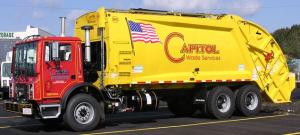
At some point in our lives we have all wondered about what happens to our recycled materials after we put them in for recycling here in Waltham. But what really happens to them?
After we throw our waste in the recycling bins or barrels, a company, Capitol Waste, picks it up from the curbside. It is then taken to Casella Waste, a processing facility in the Boston area, where the recyclables are divided and baled (tightly packed together) into the different materials. Once they have been separated and organized, Casella sells them to manufacturing companies that use the recyclables as raw materials to make new products.
Many items can be made from recycled materials. Each material is handled in a different and specific way for it to be useful again. In the case of paper, it is collected and separated by its type, which includes office paper, magazines, and newspaper. It is then taken to a paper mill where it is mixed with water to produce new paper products such as new office paper, toilet paper, and other paper products. Something similar is done with cardboard products, which are turned into new cardboard, cereal boxes, newspaper, and others. In the case of plastic the process is slightly different. Plastic is collected, separated, and baled into its different numbers. It is then melted down into pellets and is sold to a manufacturing company such as Mohawk to create nylon carpet materials.. Plastic can be sold to processors to make fleece jackets and plastic lumber. As an example, detergent bottles are cleaned up and melted to create pellets that are then sold to manufacturers to either turn back into the same kind of product like another detergent bottle or used in the creation of other products such as tennis balls or porch furniture.
Harder materials such as metal, aluminum, and glass are also turned into new products. Metal is collected and sold to a processor to be used for other metal products such as bikes. Aluminum, especially cans, is mostly sold to beer manufacturers to turn it into new cans. Aluminum cans are first compacted into bales at the recycling center, which then are sent to processing plants. There they are shredded into pieces and melted to be mixed with raw aluminum materials. The resulting mix is molded into new aluminum materials. Recycling glass is a little bit more difficult than recycling all of the previously mentioned materials. Glass is separated from the rest of the materials and is usually crushed until its texture is similar to that of sand. Some of it is sold to manufacturers to be turned into new glass, but most of it is used as gravel material. Although the cost of recycling glass is high, it has great benefit since glass takes about four thousand years to decompose, polluting the Earth for a long time.
So, what are the benefits of recycling all of these materials? Recycling allows manufacturing companies to reuse existing materials, therefore resulting in less consumption of fresh raw materials needed to create new products. It also helps to reduce the energy consumption that otherwise is required to produce new materials. In addition, recycling waste reduces air and water pollution. It decreases the amount of trash that goes into landfills and that is incinerated, cutting the amount of emissions into the air. It also prevents trash overflow that ends ups in nearby water streams, polluting them.
However, recycling does not complete its mission until customers buy recycled products. When going to a store, buy recycled products to support the recycling industry. Look for a recycling label. If there are no recycled products you can ASK the manager to carry them. It is very important that as consumers we buy recycled products. The benefits of recycling are many and it is a way for us to help sustain the environment for future generations.
Bibliography
"Recycling Basics." EPA. Environmental Protection Agency. Web. 18 Mar. 2016.
"What Happens to Recycled Items?" Savemobile.org / The S.A.V.E. Foundation, 501(c)(3) / HelenaMontana. Purdev. Web. 18 Mar. 2016.
Special thanks to Shaunna Schiller from the Casella Waste Company
Recycling Plastic Bags
Written by Sandy Watemberg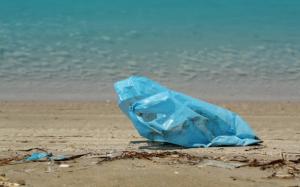
Each year, between 500 billion and a trillion plastic bags are consumed worldwide and less than 1% of those are recycled (According to data released by the U.S Environmental Protection Agency). Plastic bags pose an environmental and health threat. Their misallocation can result in tons of plastic bags in the sea, hurting sea animals who ingest them.
Plastic bags are also a problem for recycling facilities. In Waltham, curbside recyclables go to the Casella Waste Company in Charlestown, MA, to be separated and baled; specialized machines automatically separate different products. Baled products are then shipped to recycling companies to make them into new products. The problem with putting plastic bags together with recycling products is that the plastic bags get caught in the machinery. It is a real struggle to get them out since workers have to stop the whole process and spend time trying to get the plastic bag out. This slows down the activity and has negative effects in the process as a whole.
As a solution to the plastic bag problem, many stores are accepting them for recycling. Here are some locations in Waltham that accept plastic bags:
- Market Basket
- Accepts all type of clean plastic including plastic bags.
- Hannaford
- Only accepts Hannaford plastic bags.
- Shaw’s and Star Market
- Accept plastic bags from any store. Bins are outside stores for people to drop them off.
Help Save the Bees!
Written by Sandy Watemberg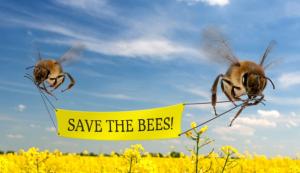
Did you know that every person who owns or keeps a lawn has a potential pollinator habitat? Many people do not realize that lawns are habitats too. How people take care of their lawns helps many animals such as pollinators. Pollinating animals, such as bees, butterflies, and birds, move and carry the pollen from flower to flower in order to fertilize the plant, ensuring that the plants will produce fruits and sets of viable seeds. However, many causes including the use of pesticides are endangering bees. Researchers find that there is a 40% decline of commercial honeybees in the United States. According to The Guardian, a British national daily newspaper with over 42 million online reads worldwide, bees pollinate a third of everything we eat and play an important role in the planet’s ecosystem. Most of the crops grown for human consumption need bees or other pollinators to pollinate them and increase their yield. This is why we should try to help and benefit them. One way to help is easy. Susannah Lerman, an adjunct research professor at UMass Amherst, says that we do not even need to plant an elaborate pollinator garden, we can help the bees if we just take a week off between mowing the lawn. She encourages people to take a week off and see this as an opportunity to shift neighborhood aesthetics to a more natural landscape full of clover, which is an important and widely grown food for bees and the soil as well. If neighbors could alternate their mowing schedules, bees would always have a yard in which to forage, transforming neighborhoods into natural habitats for bees with a more sustainable way on managing lawns. Another way to help bees is by planting only organically raised flowers and open-pollinated varieties, which let pollination occur by insects, birds and other natural factors. By taking these actions we can use our lawns to help the bees, which at the same time are helping us.
Styrofoam Collection Day
Written by Brendan Schneider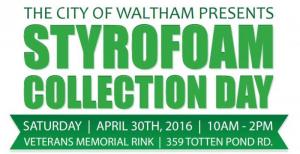
Waltham’s Consolidated Public Works Recycling Department is partnering with ReFoamit to host a Styrofoam collection. Residents will be able to drop off Styrofoam products on April 30, 2016, from 10am-2pm at Veterans Memorial Rink, 259 Totten Pond Road. Many Styrofoam items will be accepted at this drive, including foam coffee cups, foam egg cartons, foam packing blocks, and meat and produce trays. Some items cannot be accepted, so check the Waltham Recycling Department’s website for more information.
Styrofoam is one of the most commonly used materials in products, but it is also has large environmental impacts. Even though most Styrofoam products are only used for a few minutes, Styrofoam does not biodegrade easily and is estimated to last for well over 500 years.
ReFoamit is based in Leominster and collects polystyrene No.6 and No. 4. The recycling process begins by making sure that all of their collected Styrofoam is actually polystyrene. They also make sure that there is no paper or tape attached to the Styrofoam. The polystyrene is ground into smaller pieces, densified into large blocks, and sold to be made into picture frames and house molding.
ReFoamit hosts collection events throughout Massachusetts. Instead of throwing out your Styrofoam products, start saving them up for the Styrofoam Collection Day. Thanks to ReFoamit, we have an opportunity to reduce our environmental impact and make a significant cut into the amount of material that goes into our waste stream.
Organic Plant Sales
Written by Brendan Schneider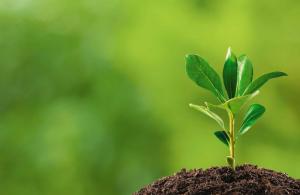
With the weather warming up and the (hopefully) last snow of the season melting away, it’s time to start thinking about what you’ll be planting this year. Plants, and the food that they produce, need water, sunlight, and nutrients to grow, but that’s only the beginning. They also rely on pollinators, and bees are chief among them. Research has shown that bee populations are in decline, threatening the health and productivity of your garden. Fortunately, there are plants that can be used to support bee populations and encourage pollination.
This spring, there will be a number of opportunities to purchase organically-raised, native, and open-pollinated plants that can thrive without pesticides and promote bee pollination. Some nearby locales will be selling a variety of vegetable, herb, flower, annual, and perennial seedlings:
- Massachusetts Audubon Habitat (10 Juniper Rd, Belmont) – May 7, 9am to 3pm
- Underwood Greenhouses (20 School St, Belmont) – Opens May 8, 7am to dusk
- Waltham Fields Community Farm (240 Beaver St, Waltham) – May 7, 9am to 4pm & May 14, 10am to 3pm
- Gore Place (52 Gore Place, Waltham) May 27-29, 9am – 4pm
- Newton Community Farms (303 Nahanton St, Newton Centre) –May 14 & 15, 12pm to 3pm
Research is showing that pesticides containing neonicotinoids may play an important role in the phenomena of bee colony collapse, in which entire bee hives are dying off. In 2014, total bee colonies in the U.S. declined by 40% as a result of colony collapse.
Herbicides or weed killers are often used by gardeners. Many of these products contain the chemical glyphosate. The World Health Organization has declared glyphosate to be a probable human carcinogen. Additionally, research suggests that glyphosate weakens the immune system of all plants it comes in contact with, not just the ones that are targeted with herbicide, and weeds appear to develop a resistance to glyphosate over time.
By using organic plants, we can help to protect ourselves as well as our plants and the bees that pollinate them. While chemical pesticides are often seen as necessary to growing a successful garden or lawn, they can come with unforeseen consequences. There are alternative methods for dealing with pests, however. Instead of using chemicals at the first sign of weeds, hand pulling, diluted white vinegar, or even a cardboard covering can do the trick. Integrated pest management is a system you can follow to keep pest populations at an acceptable level without investing too much time, money, and effort into protecting your plants. This approach starts with understanding what an acceptable pest level is and monitoring the pest and plant populations.
Button Cell Battery Recycling Program
Written by Brendan Schneider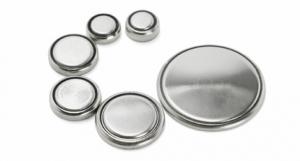
Healthy Waltham is expanding its button battery recycling program. These small, round batteries are often found in wristwatches, hearing aids, calculators, cameras, and electronic car keys. They are sometimes overlooked due to their size, but they can do serious harm, especially if swallowed by children, as they contain mercury and other toxic substances. Healthy Waltham is distributing button battery collection boxes to local businesses with the aim of taking these batteries out of the waste stream and to safely and easily dispose of them.
This button battery recycling program is funded through Wheelabrator Technologies. Waltham’s trash is sent to Wheelabrator’s waste-to-energy combustion facility, which burns garbage to generate electricity. Hazardous products such as button batteries should not be thrown in the trash. If burned, the button batteries release their mercury into the air. The mercury would then precipitate into water ways, accumulate in fish, and endanger any person or other animals that ate those fish, particularly pregnant women. By collecting button batteries, Healthy Waltham receives a rebate from Wheelabrator for this service.
Currently, there are several locations throughout Waltham in which these button battery collection boxes are scattered. The Waltham Recycling Department (165 Lexington St.), Waltham Public Library (735 Main St.), Council on Aging/Senior Center (488 Main St.), Waltham West Suburban Chamber of Commerce (84 South St.) and the Wellness Center at the Francis Cabot Lowell Mill Senior Apartments (190 Moody St.) were the first locations to participate. The Leland Home (21 Newton St.) and Benchmark Senior Living (126 Smith St. and 201 Jones Rd. #300) are also collecting button cell batteries. Please note that these containers are for button cell batteries only. No other batteries may go in these boxes. If your organization wishes to participate in this program and to display a button cell battery collection box, please send an email to info@healthy-waltham.org.
Healthy Waltham is an organization that promotes healthy lifestyles and well-being for families and underserved populations in Waltham. They use educational and collaborative programs to get residents involved with healthy cooking, gardening, physical activity, and natural open spaces. For more information, please call (781) – 891 – 4700 or email info@healthy-waltham.org. This button battery collection program provides a chance to support Healthy Waltham and to remove hazardous waste from the waste stream.

